必修一unit1讲义
- 格式:doc
- 大小:73.50 KB
- 文档页数:6
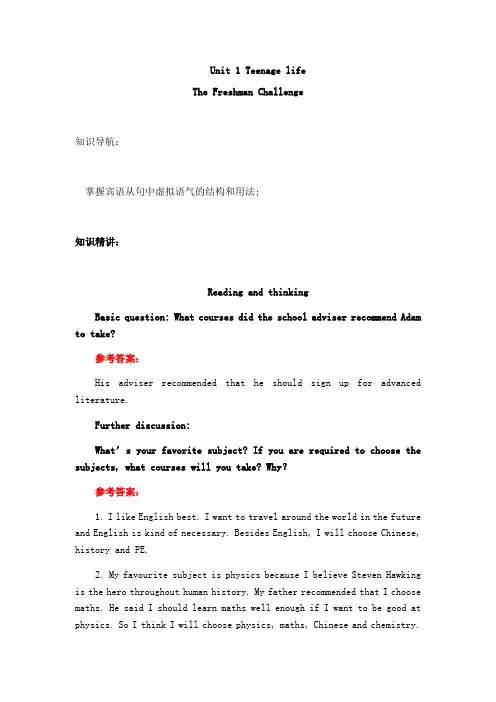
Unit 1 Teenage lifeThe Freshman Challenge知识导航:掌握宾语从句中虚拟语气的结构和用法;知识精讲:Reading and thinkingBasic question: What courses did the school adviser recommend Adam to take?参考答案:His adviser recommended that he should sign up for advanced literature.Further discussion:What’s your favorite subject? If you are required to choose the subjects, what courses will you take? Why?参考答案:1. I like English best. I want to travel around the world in the future and English is kind of necessary. Besides English, I will choose Chinese, history and PE.2. My favourite subject is physics because I believe Steven Hawking is the hero throughout human history. My father recommended that I choose maths. He said I should learn maths well enough if I want to be good at physics. So I think I will choose physics, maths, Chinese and chemistry.3. I prefer Chinese for I enjoy reading Chinese poems very much. My elder brother recommended that I choose Chinese, maths, English, physics, chemistry and biology because I want to get high marks in the entrance examination.原文:My adviser recommended that I should sign up for advanced literature. 核心考点:表示“建议、命令、要求”这类意念动词,态度动词后的宾语从句用虚拟语气。
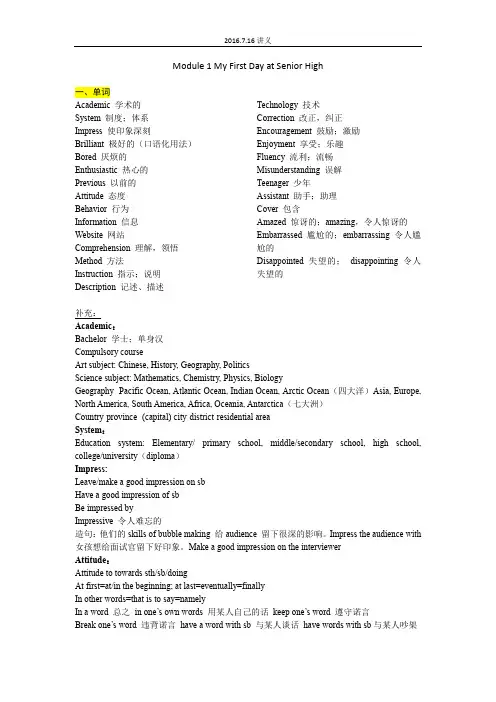
Module 1 My First Day at Senior High 一、单词Academic 学术的System 制度;体系Impress 使印象深刻Brilliant 极好的(口语化用法)Bored 厌烦的Enthusiastic热心的Previous 以前的Attitude 态度Behavior 行为Information 信息Website 网站Comprehension 理解,领悟Method 方法Instruction 指示;说明Description 记述、描述Technology 技术Correction 改正,纠正Encouragement 鼓励;激励Enjoyment 享受;乐趣Fluency 流利;流畅Misunderstanding 误解Teenager 少年Assistant 助手;助理Cover 包含Amazed 惊讶的;amazing,令人惊讶的Embarrassed 尴尬的;embarrassing 令人尴尬的Disappointed 失望的;disappointing 令人失望的补充:Academic:Bachelor 学士;单身汉Compulsory courseArt subject:Chinese, History, Geography, PoliticsScience subject: Mathematics, Chemistry, Physics, BiologyGeography- Pacific Ocean, Atlantic Ocean, Indian Ocean, Arctic Ocean(四大洋)Asia, Europe, North America, South America, Africa, Oceania, Antarctica(七大洲)Country-province- (capital) city-district-residential areaSystem:Educationsystem: Elementary/primaryschool, middle/secondary school, high school, college/university(diploma)Impress:Leave/make a good impression on sbHave a good impression of sbBe impressed byImpressive 令人难忘的造句:他们的skills of bubble making 给audience 留下很深的影响。


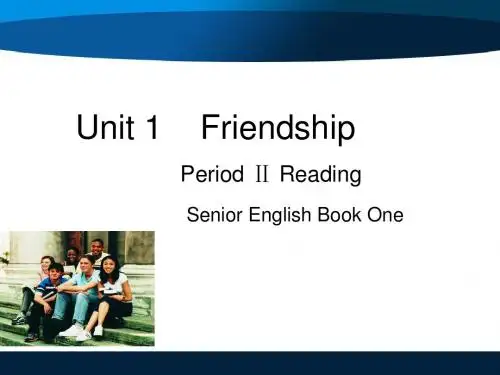

高一英语上第1次课教学目标:1.掌握unit1重点词组及词汇2.掌握直接引语变间接引语(一)3.综合训练—阅读理解一、词汇记忆①单词听写:1. upset 不安的2. loose 松的,松开的3. thunder 雷声,打雷4. power 能力,能量,权利5. dusty 积满灰尘的6. settle 安家,定居,使定居7. highway 公路,大路8. pack 捆扎,包装,打包行李9. overcoat 大衣,外套10. exactly 确实如此,正是11. grateful 感激的,表示感谢的12. tip 提示;技巧;小费②词组听写:1. add up 合计2. be concerned about 关心,挂念3. a series of 一连串,一系列,一套4. at dusk 在黄昏时刻5. no longer /not…any more 不再…6. get/be tired of 对……厌烦7. fall in love with 相爱,爱上8. calm……down 使平静下来9. go through 经历,经受10. on purpose 故意11. face to face 面对面地12. set down 记下,放下13. in order to 为了……14. suffer from 遭受,患病15. join in 参加,加入16. get along with 与……相处,进展二、直接引语和间接引语(一)复习宾语从句宾语从句三要素:语序、连接词、时态。
1、语序:陈述句语序2、连接词:①陈述句用that引导;②一般疑问句用if/whether引导;③特殊疑问句用特殊疑问词引导3、时态:①主句用过去时,从句用与过去相对应的时态;②主句是一般现在时,从句可根据实际情况用任何时态;③表示客观真理时用一般现在时;(二)直接引语和间接引语的概念:当我们用引号引出别人的原话时,被引用的部分称为直接引语,如:The boy said ,"I can speak English very well.”当我们间接地把别人的意思转述出来时,被转述的部分称为间接引语,如:Mary said that Tom had worked there before.由宾语从句我们知道,直接引语转为间接引语之后即为一个宾语从句,因此,直接引语变为间接引语时,人称、时态、引导词、状语和语序都会发生变化。
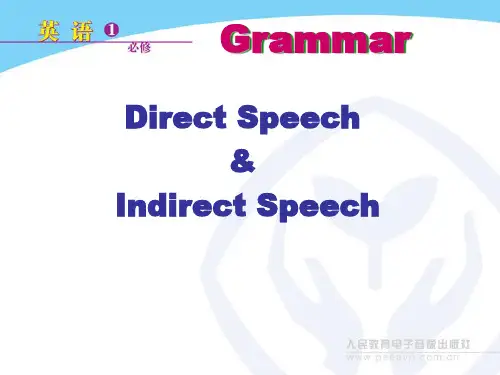
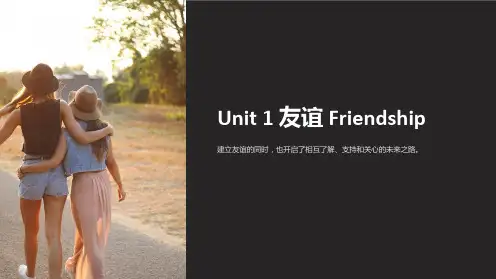
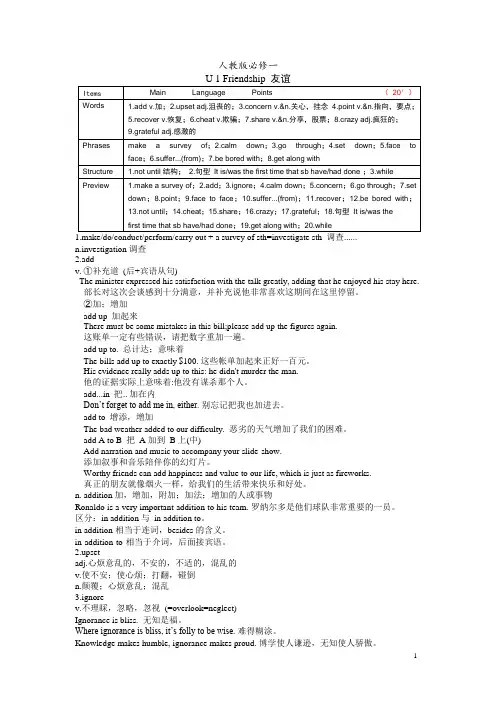
人教版必修一n.investigation 调查2.addv. ①补充道(后+宾语从句)The minister expressed his satisfaction with the talk greatly, adding that he enjoyed his stay here. 部长对这次会谈感到十分满意,并补充说他非常喜欢这期间在这里停留。
②加;增加add up 加起来There must be some mistakes in this bill;please add up the figures again.这账单一定有些错误,请把数字重加一遍。
add up to. 总计达;意味着The bills add up to exactly $100. 这些帐单加起来正好一百元。
His evidence really adds up to this: he didn't murder the man.他的证据实际上意味着:他没有谋杀那个人。
add...in 把.. 加在内Don’t forget to add me in, either. 别忘记把我也加进去。
add to 增添,增加The bad weather added to our difficulty. 恶劣的天气增加了我们的困难。
add A to B 把A 加到B 上(中)Add narration and music to accompany your slide-show.添加叙事和音乐陪伴你的幻灯片。
Worthy friends can add happiness and value to our life, which is just as fireworks.真正的朋友就像烟火一样,给我们的生活带来快乐和好处。
n. addition 加,增加,附加;加法;增加的人或事物Ronaldo is a very important addition to his team. 罗纳尔多是他们球队非常重要的一员。
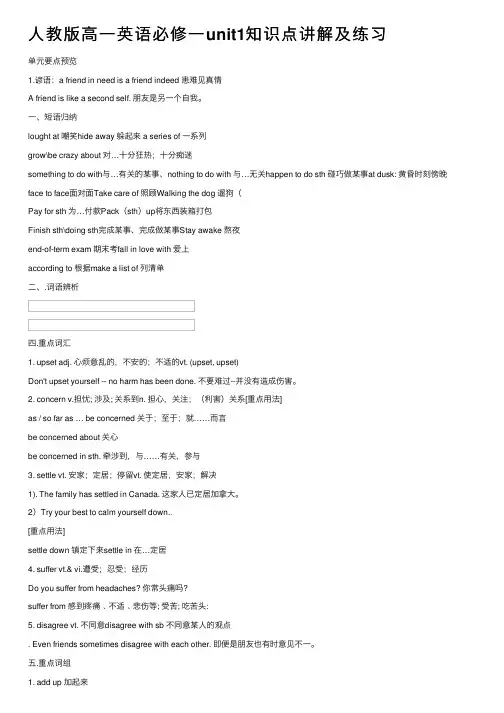
⼈教版⾼⼀英语必修⼀unit1知识点讲解及练习单元要点预览1.谚语:a friend in need is a friend indeed 患难见真情A friend is like a second self. 朋友是另⼀个⾃我。
⼀、短语归纳lought at 嘲笑hide away 躲起来 a series of ⼀系列grow\be crazy about 对…⼗分狂热;⼗分痴迷something to do with与…有关的某事、nothing to do with 与…⽆关happen to do sth 碰巧做某事at dusk: 黄昏时刻傍晚face to face⾯对⾯Take care of 照顾Walking the dog 遛狗(Pay for sth 为…付款Pack(sth)up将东西装箱打包Finish sth\doing sth完成某事、完成做某事Stay awake 熬夜end-of-term exam 期末考fall in love with 爱上according to 根据make a list of 列清单⼆、.词语辨析四.重点词汇1. upset adj. ⼼烦意乱的,不安的;不适的vt. (upset, upset)Don't upset yourself -- no harm has been done. 不要难过--并没有造成伤害。
2. concern v.担忧; 涉及; 关系到n. 担⼼,关注;(利害)关系[重点⽤法]as / so far as … be concerned 关于;⾄于;就……⽽⾔be concerned about 关⼼be concerned in sth. 牵涉到,与……有关,参与3. settle vt. 安家;定居;停留vt. 使定居,安家;解决1). The family has settled in Canada. 这家⼈已定居加拿⼤。
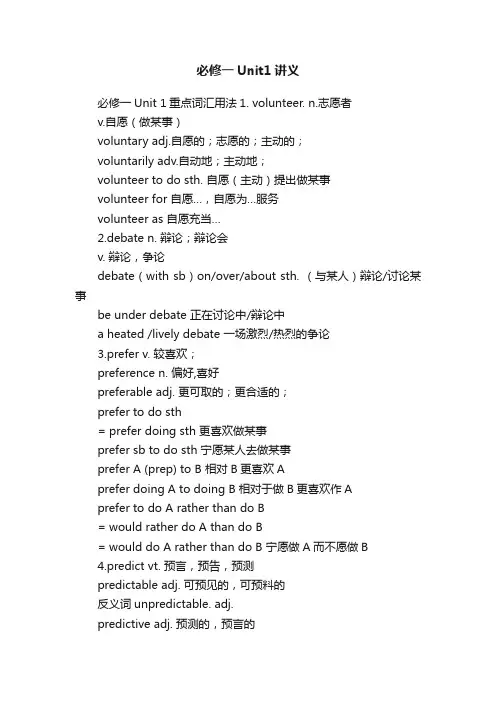
必修一Unit1讲义必修一Unit 1重点词汇用法1. volunteer. n.志愿者v.自愿(做某事)voluntary adj.自愿的;志愿的;主动的;voluntarily adv.自动地;主动地;volunteer to do sth. 自愿(主动)提出做某事volunteer for 自愿…,自愿为…服务volunteer as 自愿充当…2.debate n. 辩论;辩论会v. 辩论,争论debate(with sb)on/over/about sth. (与某人)辩论/讨论某事be under debate 正在讨论中/辩论中a heated /lively debate 一场激烈/热烈的争论3.prefer v. 较喜欢;preference n. 偏好,喜好preferable adj. 更可取的;更合适的;prefer to do sth= prefer doing sth 更喜欢做某事prefer sb to do sth 宁愿某人去做某事prefer A (prep) to B 相对B更喜欢Aprefer doing A to doing B 相对于做B更喜欢作Aprefer to do A rather than do B= would rather do A than do B= would do A rather than do B 宁愿做A而不愿做B4.predict vt. 预言,预告,预测predictable adj. 可预见的,可预料的反义词unpredictable. adj.predictive adj. 预测的,预言的prediction n. 预言,预测It's predicted that... 据预测,据预报make a prediction. 做预言,做预测5. content n. 内容,目录,主题[U]满足,满意adj. 满足的,满意的,愿意的with content 满足地,满意地be content with...= be satisfied with= be pleased with 对...满足/满意be content to do sth愿意做某事content oneself with 满足于,使自己对...感到满足6.movement n. 动作,运动,活动move v. 移动moved adj. 感动的moving adj. 感人的7. suitable adj.合适的,适用的反义词unsuitablesuitability n. 合适suit vt.对(某人)方便,满足(某人)需要,合(某人)心意be suitable for 对...适合的It's suitable for sb to do sth 某人做某事是适宜的be suitable to do sth适合做某事8.challenge n.挑战vt.怀疑,向...挑战challenger n.挑战者challenging adj.挑战性的face a challenge 面对挑战take /up /accept a challenge 接受挑战meet the challenge of 遇到...挑战challenge sb to (do) sth 向某人挑战(做)某事9.confusing adj. 难以理解的,不清楚的confuse vt.使糊涂,使迷惑confused adj. 迷惑的,糊涂的confusion n.迷惑,困惑be confused about 对...感到困惑confuse A with/and B 将A和B混淆confuse sb with sth 用某物使某人困惑in confusion 困窘地,迷惑地10.fluent adj. 流利的,熟练的fluently adv. 流利地,熟练地fluency n. 流利,流畅11. graduate v. 毕业,获得学位n.毕业生graduation n.毕业graduated adj.毕业的graduate from 毕业于...(学校)graduate in... 毕业于...(专业)12.recommend vt.建议,劝告,推荐,介绍recommendation n. 建议,劝告,推荐recommend doing sth 建议做某事recommend sb to do sth 建议某人做某事recommend that 建议...(that引导的从句中用should + do的虚拟语气,should通常省略) recommend A to B = recommend B A 把A推荐给Brecommend sb as... 推荐某人担任...13.sign up (for sth) 报名参加...(课程,活动组织等)sign n. [C]符号,记号,招牌,标志,标记[C]& [U]迹象,征兆,手势vt.签名,以手势/其他动作表示sign sb to do sth 示意某人去做某事sign in 签到14. advanced. adj.高级的,高等的,先进的advance. n. 前进,发展vi.前进,发展vt.发展,促进in advance= ahead of time 预先,事先,提前in advance of 在…提前make an advance in/ make advances in 在…方面取得进展advance on/ towards.朝…前进15. obviously adv. 显然,明显地obvious adj.明显的It's obvious for sb to do sth某人做某事是很明显的。
Unit 1 Lifestyles 讲义Lesson 1 A perfect day1. 一般现在时主要用于表示人、事物现在状况和特点;表示经常或习惯性的动作,句中常有often, always, from time to time 等时间状语;表示客观规律和永恒真理等。
He usually goes to work at 7 o’clock every morning.他通常每天早上7点钟去上班。
The earth goes around the sun.地球围绕太阳转。
表示永恒的真理,即使过去的语境中,仍用一般现在时。
I learned that the earth goes around the sun when I was in primary school.我在小学就知道地球围绕太阳转。
在时间、条件和让步状语从句中,一般现在时可以代替一般将来时。
If he accepts the job, he will get more money soon.如果他接受了这份工作,不久就会赚更多的钱。
在make sure (certain), see to it, mind, care, matter +宾语从句中,从句用一般现在时代替一般将来时。
So long as he works hard, I don’t mind when he finishes the experiment.只要他努力工作,我不介意他什么时候做完试验。
在the more… the more… (越......越......)句型中,若主句是一般将来时,从句通常用一般现在时。
The harder you study, the better results you will get.你学习越用功,成绩就越好。
2. 现在进行时的基本用法:a. 表示现在( 指说话人说话时) 正在发生的事情。
We are waiting for you.b. 习惯进行:表示长期的或重复性的动作,说话时动作未必正在进行。
⾼中英语必修⼀unit1第⼀讲第⼀讲Unit 1 friendshipBeginning:Do you know? Can you translate?谚语:A friend in need is a friend indeed 患难见真情A friend is like a second self. 朋友是另⼀个⾃我。
First step: warming upListen to two English songs~Auld Lang Syne~BrainstormThink about as many words as you can to describe a best friendShow your ideas to the questions on the textbookSecond step: Practise speaking1.What is friend?2.Talk about your old friends in junior high school, including appearance, hobbies, personality, etc.3.Show the ways how you make new friends.4. Self- introduction(Positive: honest, friendly, open-minded, generous⼤⽅的,helpful, patient耐⼼的, good-tempered 好脾⽓的, trustworthy可信任的, careful, full of love, caring, responsible有责任感的,brave, easygoing随和的, outgoing好交际的, warm-hearted, kind, selfless⽆私的, tolerant宽⼤的, intelligent聪明的Negative: selfish⾃私的,tricky狡猾的, dishonest, bad-tempered, mean⼩⽓的, impatient, narrow-minded⼼胸狭窄的, lazy, gossipy)What is friendship?I want to find the answer to the questionWhat is friendship?When it rains, I think friendship is a small umbrella.It can give me a piece of clear sky.When I’m crying, I think friendship is a white handkerchief.It can wipe my tears dry.When I am sad, I think friendship is a warm word.It can bring me happiness again.When I am in trouble, I think friendship is a strong hand.It can help me escape my troubles.When I sit in a quiet place, I think friendship is a very wonderful feeling.It can’t be pulled and torn, because it is in everyone’s heart.It is there from the beginning to the end of our livesThird step: words and phrases1. add vt.& vi. 增加;加;加起来;补充说;⼜说add to增添;增加;增进add ...to ...把……增添到……add up合计,相加add up to总数为;总计为例句:If you add 4 to 3 you get 7.四加三得七。
英语必修一unit1课件英语必修一unit1课件英语必修一unit1课件一、教学内容:Unit 1 of Module I Period Three(Grammar)二、目标与要求1、学习一般现在时态和现在进行时态。
2、一般现在时态和现在进行时态表达将来的动作。
3、对比一般现在时态和现在进行时态,掌握它们的用法和区别,进一步强化学生对该语法项目掌握的熟练程度和运用能力。
三、语法讲解一般现在时(一)时态构成:一般现在时主要由动词的原形表示,如果主语是第三人称单数,则在动词原形后加-s或-es。
(二)时态的用法:1、表示经常发生的动作、存在的状态和现阶段的习惯常用的时间状语有:often, sometimes, usually, always, seldom, in the morning, every day, on Sunday 等。
如:He is always ready to help others.The students have sports at five every afternoon.Does he work hard?2、表示不受时间限制的事实或普遍真理Three plus two is five.A plane is faster than a car.China is in Asia.Light travels faster than sound.3、在含时间和条件状语从句的复合句中主句用一般将来时,从句则用一般现在时表示将来动作。
如:I will stay at home if it rains tomorrow.She'll go to see him as soon as she arrives.When they come, they'll tell you something important.4、在含宾语从句的.复合句中尽管主句用过去时态,但如果宾语从句所述内容是客观真理,从句谓语动词仍然用一般现在时。
必修1 Unit 1 Friendship友谊一.考纲词汇梳理·活用单词荟萃1.核心单词(1)_____________(adj.)心烦意乱的;不适的;不安的(vt.)使不安;使心烦;弄翻;搅乱→_____________(过去式/过去分词)→_____________(现在分词)(2)_____________(vt.)不理睬;忽视(3)_____________(adj.)平静的;镇静的;沉着的(vt.&vi.) (使)平静;(使)镇定→_____________(adv.)沉着地;镇静地(4)_____________(vt.) (使)担忧;涉及;关系到;(n.) 担心;关注;(利害)关系→_____________(adj.)担心的;忧虑的→_____________(prep.)关于;涉及(5)_____________(adv.)在户外;在野外→_____________ (adj.)户外的;室外的(6)_____________(vi.)定居;安家;停留(vt.)解决;安排;使定居→_____________(n.)定居点;解决(7)_____________(vt.&vi.)遭受;忍受;经历→_____________(n.)折磨;苦难(8)_____________(vt.&vi.)痊愈;恢复;重新获得→_____________(n.)康复;痊愈;复得(9)_____________(v.)捆扎;包装;打行李(n.)小包;包裹(10)_____________(vi.)不同意→______________(n.)不同意→______________(vi.)同意→______________(n.)同意2.阅读单词survey [ˈsɜːveɪ]调查;测验loose [luːs]松的;松开的Netherlands ['neðələndz]荷兰(荷兰国家)German ['dʒɜːmən]德国的;德国人的;德语(的);德国人series ['sɪəriːz; -rɪz]连续;系列dusk [dʌsk]黄昏;傍晚thunder ['θʌndə] v打雷;雷鸣;n雷;雷声entire [ɪn'taɪə; en-]整个的;完全的;全部的entirely [ɪn'taɪəlɪ; en-]完全地;全然地;整个地power ['paʊə]能力;力量;权力curtain ['kɜːt(ə)n]窗帘;门帘;幕布dusty ['dʌstɪ]积满灰尘的partner ['pɑːtnə]伙伴;合作者;合伙人highway ['haɪweɪ]公路;大路;<美>高速公路suitcase ['suːtkeɪs]手提箱;衣箱overcoat ['əʊvəkəʊt]大衣;外套teenager ['tiːneɪdʒə]十几岁的青少年exactly [ɪg'zæk(t)lɪ; eg-]确实如此;正式;确切地grateful ['greɪtfʊl; -f(ə)l]感激的;表示谢意的dislike [dɪs'laɪk] v不喜欢;厌恶tip [tɪp] n.提示;技巧;尖;尖端;消费 vt.倾斜;翻到swap [swɔp, swɔ:p]交换item ['aɪtəm]项目;条款3.联想积累1.“adv. +n.”构成的合成词①outdoors adv.在户外;在野外 outdoor adj.户外的②indoors adv. 在室内;往室内 indoor adj. 室内的;③upstairs adv. 在楼上;往楼上adj. 楼上的④downstairs adv. 在楼下;往楼下adj. 楼下的⑤uptown adv. 在/向住宅区adj. (位于市镇外围)住宅区的⑥downtown adv. 在商业/闹市区adj. 商业区的;闹市区的2.副词“完全地”家族①entirely ②totally ③wholly④fully ⑤absolutely ⑥completely 3.“感谢”家族①grateful adj.感激的 gratitude n. 感激②appreciate vt.感激;感谢 appreciation n. 感激③thank vt.感谢 thankful adj. 感激的④acknowledge vt.感谢;承认acknowledgement n.鸣谢;感谢;承认4.dis否定前缀高频词集锦①dislike vt.不喜欢②disagree vi.不同意③discourage vt.使气馁④discover vt.发现⑤disobey vt.不服从⑥disabilit y n.残疾⑦disadvantage n.不利条件;弱点⑧disappear vi.消失⑨disappoint vt.使失望⑩disclose vt.揭开;泄露短语聚焦1.合计 __________________2.(使)平静下来;(使)镇定下 __________________3.不得不;必须 __________________4.关心;挂念 __________________5.遛狗 __________________6.经历;经受 __________________7.记下;放下;登记 __________________8.一连串的;一系列;一套 __________________9.故意 __________________10.为了…… __________________ 11.在黄昏时刻 __________________12.面对面地 __________________13.不再…… __________________14.遭受;患病 __________________15.对……厌烦 __________________16.将(东西)装箱打包 __________________17.与……相处;进展 __________________18.相爱;爱上 __________________19.参加;加入 __________________词汇活用Ⅰ.单词填空(用所给单词的适当形式填空)1.Don’t ___________ yourself about it. Forget it.(upset)2.Our parents are___________(concern)about ourhealth and future.3.Never before has our country been so__________ (power)as it is today.4.We ________ (like) those who talk big and do nothing.5.The doctor had given her up but she made an excellent _________(recover).6.I wanted to play football yesterday but my mom ____________(disagree).7.The journey took __________ (exact) three hours.8.I said hello to her ,but she __________(ignore) me completely.9.She ___________(suffer)from heart disease since 2008. 10.Theearthquakedestroyedthetown_________(entire).Ⅱ.短语填空(用所给短语的适当形式填空)1.I'vealwaysfounditdifficultto________________him.2.I ___________her the first time I saw the beautiful girl.3The country has ______________ too many wars. 4.After we quarreled, he simply______________his things and moved out. 5.Isoldmycar,becauseIcould_____________afford it.6.If you want to know the total ,you'd better _____ _______the numbers.7.Why don't you ________________your ideas on paper?8.Do you often ________________ headaches in winter?9.I didn’t do it _______________ — it was an accident.10.His dream is to meet his favorite pop star___________.二.重点句型精讲·精练1.While walking the dog ,you were careless and itgot loose and was hit by a car.(教材P1)当遛狗时,你太粗心,结果狗跑掉并且被车撞了。
词法一.重点词汇1. upset adj. 心烦意乱的,不安的;不适的vt. (upset, upset)[典例]1). Our arrangements for the weekend were upset by her visit. 她一来把我们周末的安排给打乱了。
2). Don't upset yourself -- no harm has been done. 不要难过--并没有造成伤害。
3). He was horribly upset over her illness. 他为她的病而忧心忡忡。
4). The students really upset her. 学生们着实让她烦恼。
[重点用法]be upset by… 被…… 打乱upset oneself about sth 为某事烦恼2. concern v. 担忧; 涉及; 关系到n. 担心,关注;(利害)关系[典例]1). The news concerns your brother. 这消息与你兄弟有关。
2). The boy's poor health concerned his parents. 那男孩健康状况不佳,使他的父母亲忧虑。
3). That's no concern of mine. 那不关我的事。
4). Officials should concern themselves with public affairs.[重点用法]as / so far as … be concerned 关于;至于;就……而言be concerned about 关心be concerned at / over sth. 为某事忧虑be concerned with sth. 牵涉到,与……有关,参与Concern oneself with 关心3. settle vt. 安家;定居;停留vt. 使定居,安家;解决settlement n. 解决协议书定居点settler 移民者[典例]1). He settled his child in a corner of the compartment. 他把孩子安顿在车厢的一个角落里。
2). The family has settled in Canada. 这家人已定居加拿大。
3). It’s eleven o’clock now, but she cannot settle to work.都十一点了,她安不下心来工作。
4). Since it is so difficult, who can settle this problem?题目这么难,谁能解决?[重点用法]settle down 镇定下来settle in 在…定居settle to do sth 决定做某事settle that 。
决定。
4. suffer vt.& vi.遭受;忍受;经历[典例]1). Do you suffer from headaches? 你常头痛吗?2). She's suffering from loss of memory. 她患有遗忘症。
[重点用法]suffer from/with/for sth 感到疼痛﹑不适﹑悲伤等; 受苦; 吃苦头:1).我们在金融危机中损失惨重。
We suffered huge losses in the financial crisis2).他的脚痛得不得了。
He suffers terribly with his feet..5. disagree vt. 不同意[典例]1). Even friends sometimes disagree with each other. 即便是朋友也有时意见不一。
2). We disagreed on future plans. 我们对未来的计划产生了分歧。
[重点用法]The reports from Rome disagree with those from Milan.罗马的报道与米兰的不符。
. He disagreed to let me go home early.他不同意让我早些回家。
6 power n. 能力;力量;权力。
Powerful powerless powerfullyHave the power to do sth 有权做某事brain power 智力Political power 政权electric/water power 电/水力Power station 发电站come into power / be in power 掌权二.重点词组1. add up加起来[典例] 1). Add up your scores and see how many points you can get.把你的得分加起来,看看你能得几分。
2). Tom, what do ten, twenty and five add up to?汤姆,10,20和5加起来是多少?[短语归纳]add (…) to …. (把什么)加入…中add up to … 加起来是[练习] 用add的适当形式或构成的词组填空1). Will you add some more students to this project?2). Small numbers add up to a large one.3). 50 added 50 equals 100.2. go through 经历;经受[典例] 1). The country has gone through too many wars. 这个国家经历了太多的战争。
2). She's been through a bad patch recently. 她最近经历了一段困难时期。
[短语归纳]go after追求,追赶go ahead前进;请说(做)吧go by走过,(时间)过去go along with向前,(与……)一起去go in for爱好,从事go out外出;(灯,火)熄灭go over越过;复习go up爬上,(价格等)上升1). It is wise not to go on with this plan.2). Prices go up a little now. People are happy.3.on purpose 故意,有目的地[典例]The boy broke Jack’s window on purpose. He wanted to frighten Jack.那男孩是故意打破杰克的窗玻璃的,他想吓一下杰克。
[短语归纳]do sth. on purpose: 故意做某事on purpose 表示故意地、有企图、有目的地1). He didn’t do it on purpose2). What was your purpose4. get along with与某人相处;(工作的) 进展[典例]1). He is not easy-going. It’s very hard to get along with him 他不是个随和的人,很难相处。
2). How are you getting along with your work? 工作进展如何?[短语归纳]get along/on well/ nicely/ badly with 与……相处得好/不好,……进展顺利/不顺利get away离开,逃离get down下来;写下,取下get down to (doing)开始认真干……get over克服,摆脱get through通过,做完get together聚集1). Are you getting along well with your colleagues? 你现在和同事相处得好不好?2). She's got her old job back.她已重新获得从前那份工作。
5. in order to…为了……(可置于句首或句中)[典例] 1). She arrived early in order to get a good seat. 她到得很早, 图的是得个好座位。
2). I agreed to her suggestion in order not to upset her. 我同意她的建议是为了不让她伤心。
[短语归纳] in order that…以便……(后跟句子)so that…以便……(后跟句子)so as to为了……(只能置于句中,不能置于句首)1.He left early in order to/so as to/in order that/so that he should/would/might arrive on time. 他早早动身好按时到达。
2. In order to get everything ready by 6 o'clock, she worked hard.她拼命干以便能到6点时把一切都准备好。
6.Face to face面对面Mouth to mouth heart to heart shoulder to shoulder back to backside by side one by one Step by stepHand in hand arm in arm.词语辨析1. ignore / neglect / overlook【解释】ignore 通常指有意不顾,或不理会显而易见的事物。
neglect 侧重指有意的忽略或忽视,也可指粗心与疏忽。
overlook 指因匆忙而疏忽或视而不见。
1We could not afford to overlooked such a serious offence.2). He utterly ignored my warnings and met with an accident.3). Don’t neglect paying him a visit now and then.2. cheat / fool【解释】cheat 主要指盈利的买卖中或游戏竞赛中欺骗人,骗取人的钱等。
fool “愚弄”,指利用人缺乏常识,心理脆弱来欺骗人。
1). You may get cheated in that shop.2). He can’t foo l her. She sees through him every time.3. calm / quiet / silent / still【解释】calm 天气、水、水面(表风平浪静);(指人时)表示镇定自如。